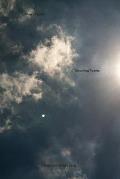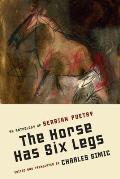
True confession: I love anthologies. Travel writing, mysteries, literary essays, and fiction — virtually anything, if it's well done, will command my undivided attention. Well, at least for a while, until the next Excellent Endeavor comes along.
But, in my heart, one style really takes precedence — poetry.
In my experience, poetry anthologies are gateways to the new and unexplored. They are an opening to the wondrous for those new to the form, forays in a carefully crafted deepening for seasoned poetic travelers, and, quite simply, literary opiates for those readers who, like me, continue to search for Blake's "palace of wisdom," or Coleridge's "Xanadu."
Admittedly, it's sometimes difficult to find something fresh, something in the anthological universe to make the hair stand up on the back of your neck. Several titles do come to mind — Simic's The Horse Has Six Legs, his anthology of Serbian poets, or Conductors of the Pit, Clayton Eshleman's unnerving collection of darkly intoxicating translations — but there are so many more, and most of them just don't come near Pound's dictum to "make it new."
Imagine my pleasure, then, at having received an anthology that has kept me totally enchanted for several weeks, an anthology that I can see myself revisiting time and time again, both for edification and for sustenance. That book is Time of Grief: Mourning Poems, edited by Jeffrey Yang.
Yang, an editor at both New Directions publishers (who brought out this volume) and the New York Review of Books, is the author of several stand-alone collections of his own work, and the editor of one previous New Directions anthology, Birds, Beasts, and Seas: Nature Poems from New Directions.
Obviously, Time of Grief includes poems from the New Directions pantheon, in itself a treasure house of much of the best work of the last 100 years. William Carlos Williams, Nicanor Parra, Anne Carson, Kenneth Rexroth, Susan Howe, Kamau Brathwaite, Luljeta Lleshanaku, the known and the unknown alike, are all represented here. So are many New Directions translations from such far-flung fields as ancient Greece and China and modern Albania and Chile. In truth, imagination seems to be the only limit.
 As stated on the cover, the book's theme is mourning, and indeed most of the poems touch on that subject, at least tangentially. They may address the loss of a love or the end of a relationship, but to take Time of Grief as merely a theme anthology, to automatically shelve it next to a collection of war poetry or socialist poems, is to do it a serious disservice. This book rises immediately to a point that is head-and-shoulders above most other examples of the genre. Based solely on the translations of Rexroth and Pound and the single, exquisite piece by Denise Levertov, Time of Grief is worth its price. But, this handful of poems only tickles the palate. The rest of the book consists of a chorus of poems that sing and wail and offer sheer, unalloyed beauty to the lucky reader to accompany her through her days. Dig deep. Whether you're someone new to poetry, tentatively exploring the unknown and unimaginable, or a seasoned, grizzled veteran, this book will continue to give rich sustenance.
As stated on the cover, the book's theme is mourning, and indeed most of the poems touch on that subject, at least tangentially. They may address the loss of a love or the end of a relationship, but to take Time of Grief as merely a theme anthology, to automatically shelve it next to a collection of war poetry or socialist poems, is to do it a serious disservice. This book rises immediately to a point that is head-and-shoulders above most other examples of the genre. Based solely on the translations of Rexroth and Pound and the single, exquisite piece by Denise Levertov, Time of Grief is worth its price. But, this handful of poems only tickles the palate. The rest of the book consists of a chorus of poems that sing and wail and offer sheer, unalloyed beauty to the lucky reader to accompany her through her days. Dig deep. Whether you're someone new to poetry, tentatively exploring the unknown and unimaginable, or a seasoned, grizzled veteran, this book will continue to give rich sustenance.
To close, let me share one poem — one of dozens I had to choose from — from Time of Grief. It's called "My Heart's as Empty as This Pail," and it's by Aharon Shabtai. Now, imagine a whole book composed of material like this. Enjoy.
My heart's as empty as this pailwithout you
I'll lean
over the bathtub
and fill it with water
and soak
the dishrag in it
then mop the floor